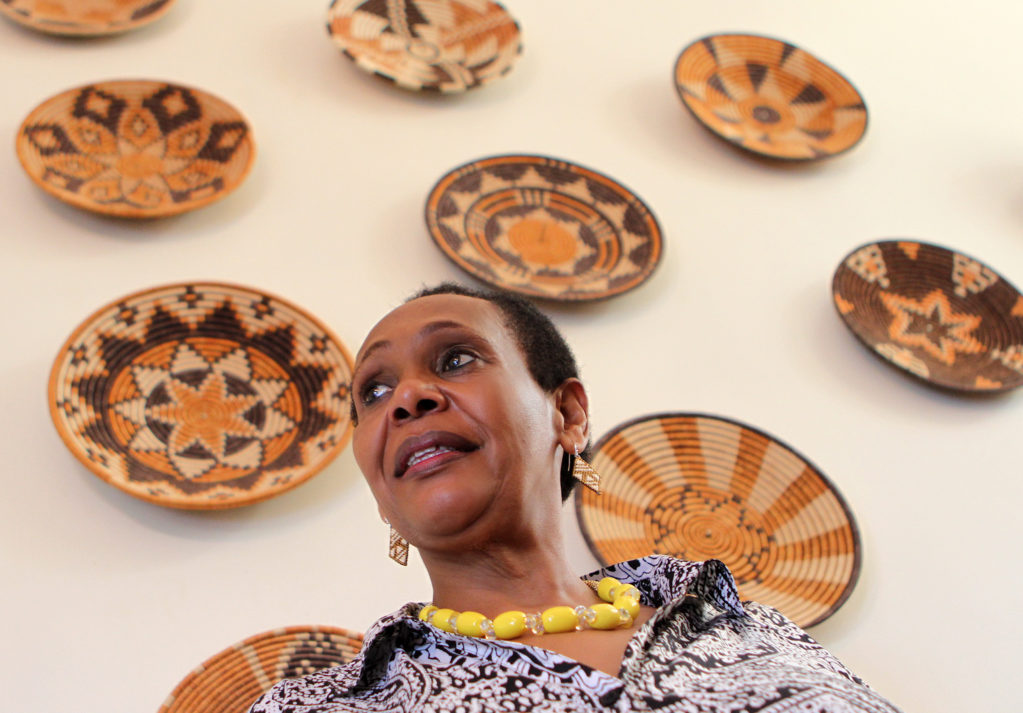Joy Ndungutse’s two-storied home in the upscale Kagugu area of Kigali is a fitting showcase of her artistic taste and talent. There are woven baskets on the walls, wooden chests and African figurines by the stairs, and an open patio featuring plush red cushions and a view of Rwanda’s rolling green hills.
Ndungutse, 57, is sprawled on a sofa, and offering homemade organic juice. “Try it,” she insists. Her large-heartedness becomes more evident when she says: “My whole life is devoted to the welfare of women. I want them to win awards and be motivated. You empower a woman, you empower a community.”
Ndungutse is referring to the brand she founded and has made her so famous, from Kigali to Madison Square in New York. Gahaya Links, a range of home décor and tribal jewelry handcrafted by Rwanda’s rural women, is sold across all Macy’s stores in the United States (US).
To think Ndungutse’s life started in a dingy refugee camp in Uganda.

Joy Ndungutse
Founder of Gahaya Links
Born poor into a family of “farmers and cattle-keepers”, Ndungutse spent her childhood in Uganda as a refugee with her parents, far from her hometown in Rwanda.
“I have seen and felt hunger, there is nothing I don’t know about suffering, and that is the reason I do what I do,” she says. She had eight siblings growing up, and while her father went looking for food, her mother would boil water to give the children hope there was food coming.
“We would see the steam and imagine food on the plate. The mothers suffered the most, that is why I really wanted to work hard and do something for the lot of rural women,” she says.
Ndungutse would see her mother and sister weaving baskets and that income paid their school fees. She soon studied to become a secretary, and found herself winging her way to the US. But her refugee upbringing never left her mind. That was to shape her career in the years to come.
“I was a very good secretary. I met my husband in Washington and lived in the US for 15 years until the war started in Rwanda. I had both my children in the US.”
In 1994, she returned to Rwanda and saw the country in shambles in the aftermath of the genocide. She wanted to help rural women left hopeless by the tragedy.
“I was not a rich woman, but I had skills to share, having studied design in America. I knew how to weave baskets.” Ndungutse’s business venture literally started under a tree in a small village called Gitarama in Rwanda’s southern province.
She began by teaching 20 women, and that figure has now grown to a network of 5,000 Gahaya Links weavers. She taught them traditional weaving in turn empowering them.
“I told the women they should change the way they weave and make it income-generating. I taught them to make quality products under that tree,” says Ndungutse, who also roped in her sister Janet Nkubana to help. The baskets were made from local materials like sweet grass, bamboo and papyrus. A visiting friend from New York saw them and placed an order. The handcrafted baskets were a hit.
“The products appeared in Parade magazine in the US and that was an opening for us. We subsequently did an exhibition in the US and Macy’s loved our products. We have been displaying our products in Macy’s since 1997. We are very strong partners with them. We have also done O bracelets for Oprah, have done necklaces and bags for Kate Spade, and I once gifted baskets to Bono and he wrote a letter thanking me,” says Ndungutse.
Along with her sister, who continues to be her business partner, Ndungutse’s next task was to train the women and step up production to make it sustainable. Her mother offered her large home, where she trained the local women.
“We trained the trainers and they trained others, creating a network. We now have 75 cooperatives across Rwanda.”
Ndungutse says Rwandan President Paul Kagame launched her products at Macy’s to show his support for the people of Rwanda.
“President Kagame inspires me. I do not want to fail him. I tell people he is our hero. He is very committed to the empowerment of women in Rwanda. How many presidents would stand in a department store to launch a product?”
Ndungutse also has a line of jewelry sold by American retail major Anthropologie. There have been awards as well, notably from The Museum of Arts and Design in New York. She has now put up a new factory in Kicukiro district in Kigali and has added a textile component.
“My life is simple. I laugh a lot and like to have a good time. I work hard, even on weekends. Next year, we are planning to open in the European market. Our designs are inspired by tradition, and positioned for the high-end luxury market,” says Ndungutse.

Joy Ndungutse
The basket-weaving program has no doubt fostered a sense of security and entrepreneurship among the women she supports.
“Basket-weaving has a reconciliation factor. We are working with all women not [differentiating them as] Hutus and Tutsis. Through the weaving, they have been able to forgive each other; they don’t live in anger. I feel wealthy when I see the change in their lives. They are able to hold their heads high and support their families. I may retire soon, but I want to leave a legacy of women who become real entrepreneurs. When that happens, I will die a happy woman.”
